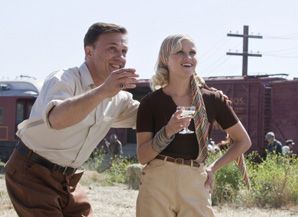|
|
Book Vs. Movie: Water For ElephantsBy Russ BickerstaffApril 27, 2011
With respect to the plot, much has been cut out to expedite delivery of all the major story elements. Perhaps the biggest absence felt onscreen is that of the character of Uncle Al. The film completely eliminates this character in favor of a typically brilliant Christopher Waltz as August — who also serves as the head of the circus in the film. There’s some really classy depth to Waltz’s performance, which goes a long way towards making the movie likeable. He’s a villain, yes, but a satisfyingly pathetic one with an affable side. He’s taken Gruen’s relatively weak character and made him a bit more interesting. Things proceed pretty much the way they do in the novel with the exception of all the pointless little bits of narrative about an aging Jacob in the modern world. Here, the aging Jacob scenes bookend the story without intruding on the story beyond intro and ending scenes. Hal Holbrook plays an older Jacob with considerable humanity and genuine emotion. With a career stretching back to the mid-1960s, Holbrook knows how to deliver a deeply emotional, heartfelt performance that is onscreen for only the briefest period of time. The Verdict With LaGravenese’s script being a really tight, economical adaptation of Gruen’s book, it’s quite fitting (though no less disappointing) that the movie would be as bad as the book (albeit in different ways for different reasons.) Neither seem animated by much interest in telling an actual story. Both appear to have been projects for the sake of developing work. Many will read the book for the sake of reading a book. Many will see the film for the sake of seeing a film. Anyone expecting any more than that out of either will be grossly disappointed.
[ View other columns by Russ Bickerstaff ]
[ View other Book vs. Movie columns ]
[ Email this column ]
|

|
|
|

|
Sunday, April 28, 2024
© 2024 Box Office Prophets, a division of One Of Us, Inc.


